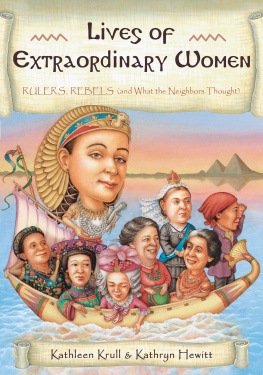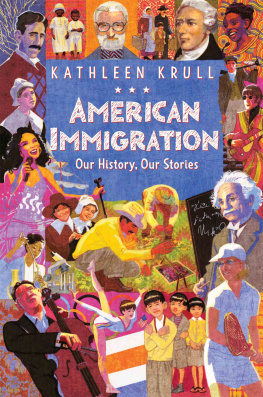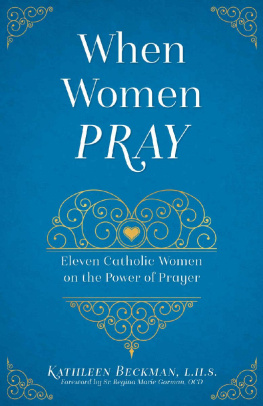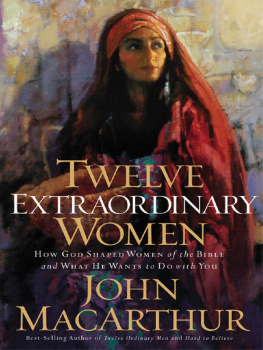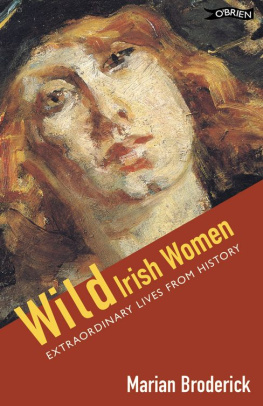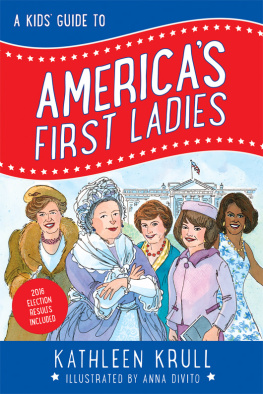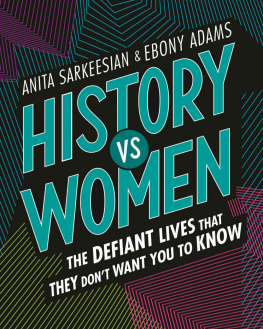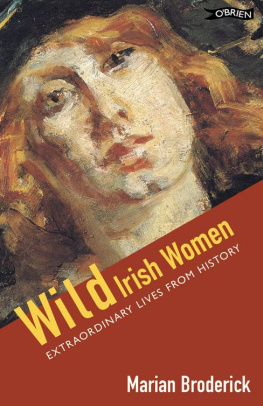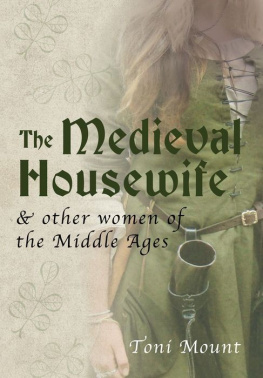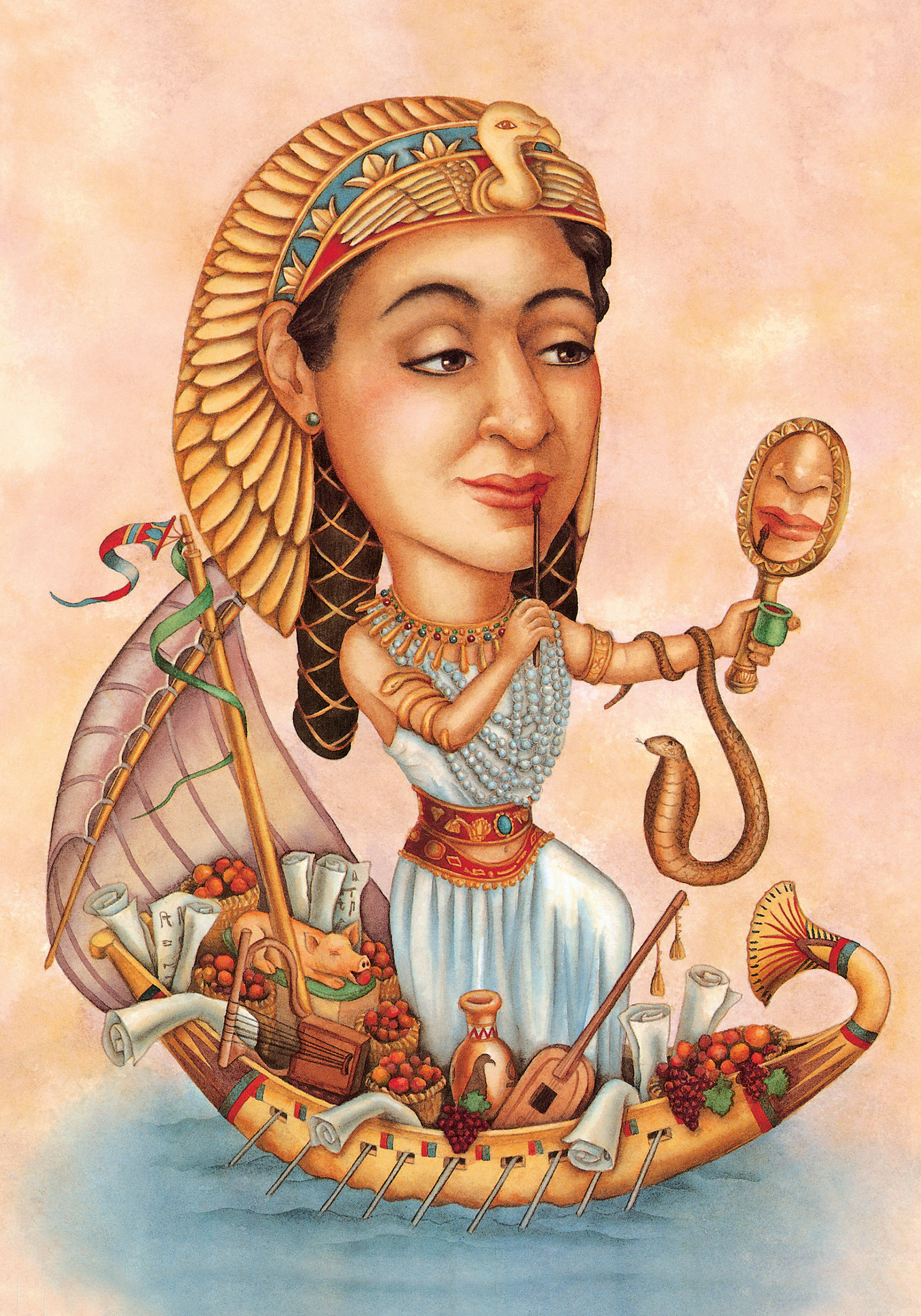1. Cleopatra
2. Victoria
3. Harriet Tubman
4. Indira Gandh
5. Eleanor Roosevelt
6. Marie Antoinette
7. Tzu-hsi
8. Rigoberta Mench

Athena, Greek goddess of handicraft, war, and wisdom
Text copyright 2000 by Kathleen Krull
Illustrations copyright 2000 by Kathryn Hewitt
No part of this publication may be reproduced or transmitted in any form or by any means, electronic or mechanical, including photocopy, recording, or any information storage and retrieval system, without permission in writing from the publisher.
All rights reserved. For information about permission to reproduce selections from this book, write to or to Permissions, Houghton Mifflin Harcourt Publishing Company, 3 Park Avenue, 19th Floor, New York, New York 10016.
www.hmhco.com
The illustrations in this book were done in watercolor and colored pencil on watercolor paper.
The Library of Congress has cataloged the print edition as follows:
Krull, Kathleen.
Lives of extraordinary women: rulers, rebels (and what the neighbors thought)/written by Kathleen Krull; illustrated by Kathryn Hewitt.
p. cm.
Includes bibliographical references ().
[1. Women in politicsBiographyJuvenile literature. 2. Women heads of stateBiographyJuvenile literature.] I. Hewitt, Kathryn, ill. II. Title.
HQ1236.K8 2000
320'.082dc21 99-6840
ISBN: 978-0-15-200807-9 hardcover
ISBN: 978-0-544-24761-1 paperback
eISBN 978-0-547-54164-8
v3.0717
Much gratitude to Jeannette Larson, Queen of Editors, as well as Diane DAndrade for her royal influence, Jean Ferris, Susan Cohen, Sandy Schuckett, Vicky Reed and her extraordinary class at the University of San Diego, and, as always, Kathryn Hewitt.
K. K.
Love and praise to glorious Jeannette Larson, Diane Dondratey (aka Diane DAndrade), Susan Cohen, Kathleen Krull, Gracie Strauss, and my extraordinary mother, Mary Moore.
K. H.
Intro d uct i on
NOT ALL GOVERNMENTS HAVE BEEN run by men. Here, in chronological order, are twenty women who wielded significant political power, as queens, warriors, prime ministers, revolutionary leaders, Indian chiefs, first ladies, or other government officials.
Each of these extraordinary women triumphed (some at a very young age) over attitudes and conditions that couldnt have been more adverse. Many of the women who are todays beloved heroines were once candidates for Most Hated Woman on Earthand were spat upon, jailed, even murdered. Their electrifying personalities can seem larger than lifebut are they really so different from us? What were they like as human beings? What might their neighbors have noticed?
Traditionally, historians have talked most often about what powerful women looked like. This book focuses on daring deedsand it asks unusually nosy questions, seeking a full picture of these womens lives. Whose secret to success was the library? (Cleopatra.) Who tickled her favorite companions neck when she thought no one was looking? (Elizabeth I.) Who could raise $50 million in one night, and also did other peoples laundry, by hand? (Golda Meir.) Who launched her career at the youngest age? (Joan of Arc, at thirteen.) Who wished she could quit and write novels? (Eleanor Roosevelt.) Who took only two baths in her entire life? (Isabella I.) Whose lips turned green after she nibbled her macaroni necklace? (Eva Pern.)
And who dressed like a man, in animal skins, armed with every possible weapon? (Nzingha.) Who attended sances with her own royal psychic? (Victoria.) Who cut power to the microphones of obnoxious interrupters? (Wilma Mankiller.) Who had three thousand boxes of everyday jewels? (Tzu-hsi.)
Not all of these women are role models. Like any group of individuals, male or female, this one includes the good, the bad, and some who were both. Their stories are offered here to inspire awe at the power of women throughout historyand ever after.
Kathleen Krull
L IFE AT THE L IBRARY
Cleopatra
BORN IN 69 B.C. AND
DIED IN 30 B.C. IN A LEXANDRIA, E GYPT
Queen of ancient Egypt, famous for glamorous love affairs, ambition, and political genius
WAS CLEOPATRAS FAMILY too CLOSE ? To keep their power as Egypts rulers, the Ptolemy family deliberately married one anothersister to brother, parent to child. But some days they werent close at all. When fighting over the throne, they frequently resorted to murder.
Her fathers favorite, Cleopatra spent her childhood in the royal womens apartments. She studied the same subjects as boys, immersing herself in literature, philosophy, the sciences, music, and art. With ambitious relatives and other enemies seething dangerously around her, she developed nerves of steel. At age eighteen she was still aliveand queen. She coped with the required marriage to her ten-year-old brother by pretending he didnt exist. (She was not a good big sisterthis brother turned up drowned, and another was poisoned.)
As queen, Cleopatra dedicated herself to keeping Ptolemies in power, with Egypt productive and independent. Above all, she wanted to avoid war with the mighty Roman Empire. The eight languages she spoke came in handy during diplomatic negotiations. She cultivated the good opinion of ordinary Egyptians and conducted the countrys business shrewdly.
During her travels, Cleopatra looted foreign libraries for precious papyrus scrolls to add to her world-famous library in Alexandria. She spent much of her time alone there, and it is thought that she may have made her own literary contributiona volume on cosmetics. With a flair for drama, she constantly experimented with makeup, hairstyles, and new perfumes made from exotic flowers. She bathed in donkeys milk, had servants remove all her unwanted body hair, and soothed her flawless skin with fresh aloe vera leaves.
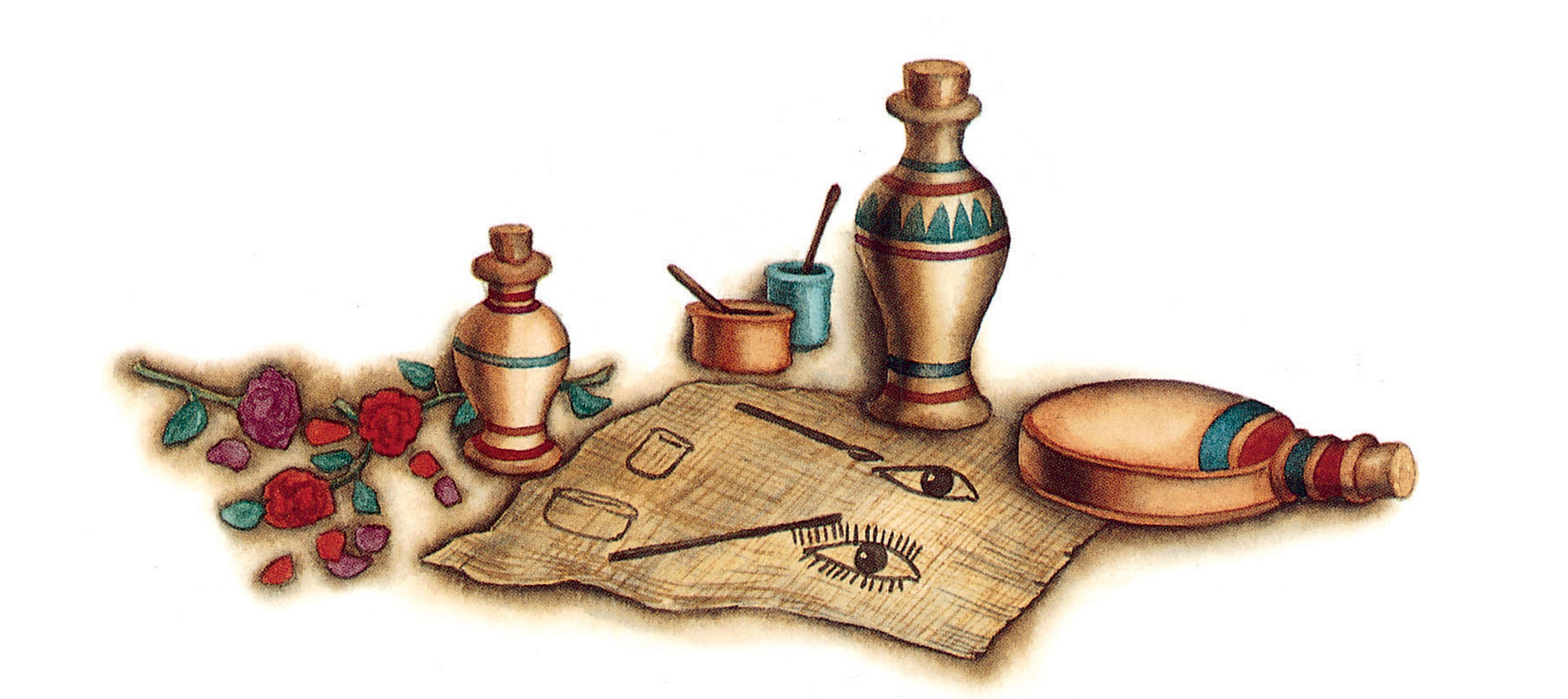
She did know how to make an entrance. When Julius Caesar, Romes brilliant military leader, visited Alexandria, he received one of historys most famous gifts: an Oriental carpetwith the queen wrapped inside. (Had she been caught, guards would have killed her on the spot.) Cleopatra and Caesar fell in love instantly; how thrilling that he also happened to be the most powerful ally Egypt could have. Together they cruised the Nile on a royal barge, discussing all the issues of the day, like how best to rule the world. Their son was named Ceasarion.
Romans raised their eyebrows at this power-hungry woman from the mysterious East, a region so strange that it allowed women to rule. Even Caesars friends grew afraid of her influence (a contributing factor in their successful plot to murder him).
His successor, Marc Anthony, kept sending for Cleopatra. She let time pass, then made another dramatic entrance: She arrived on a ship covered in gold, with sails of purple, and with silver oars rowed in time to flutes and harps that musicians were playing on deck. Anthony won her heart with new scrolls for her libraryand by executing her only remaining sibling, a hostile younger sister.

